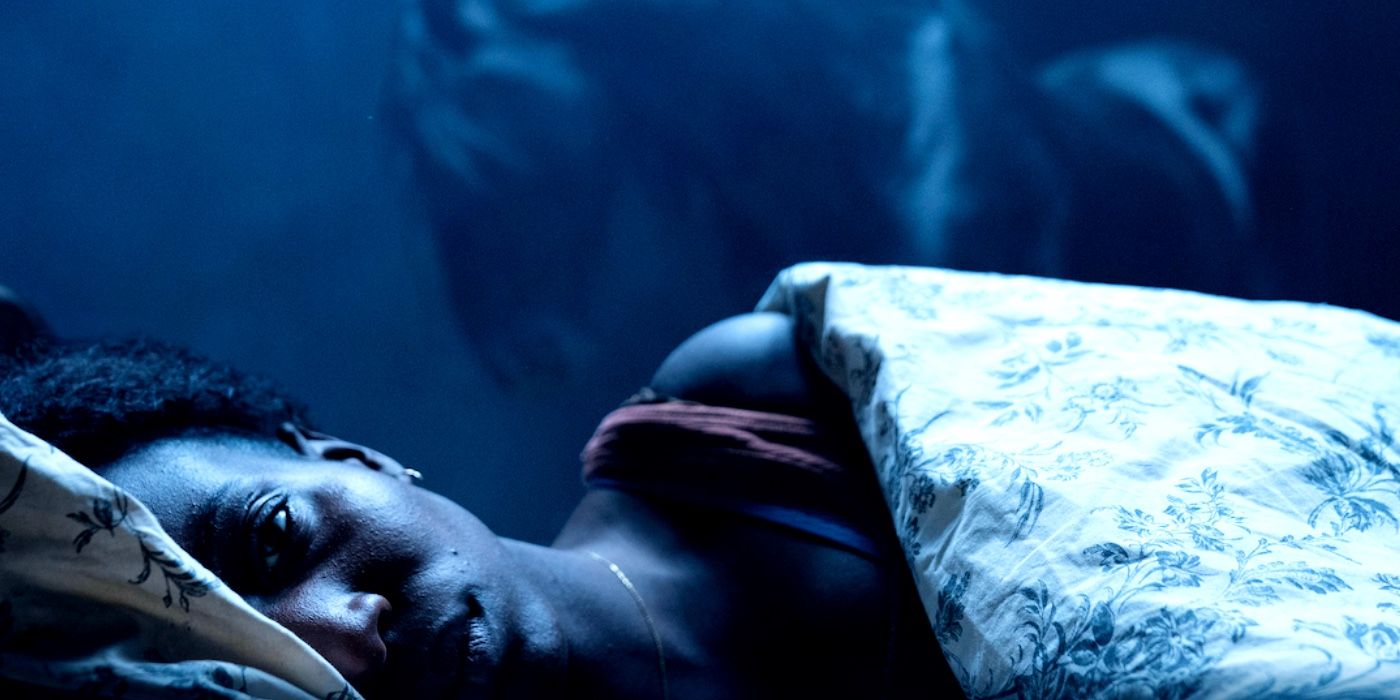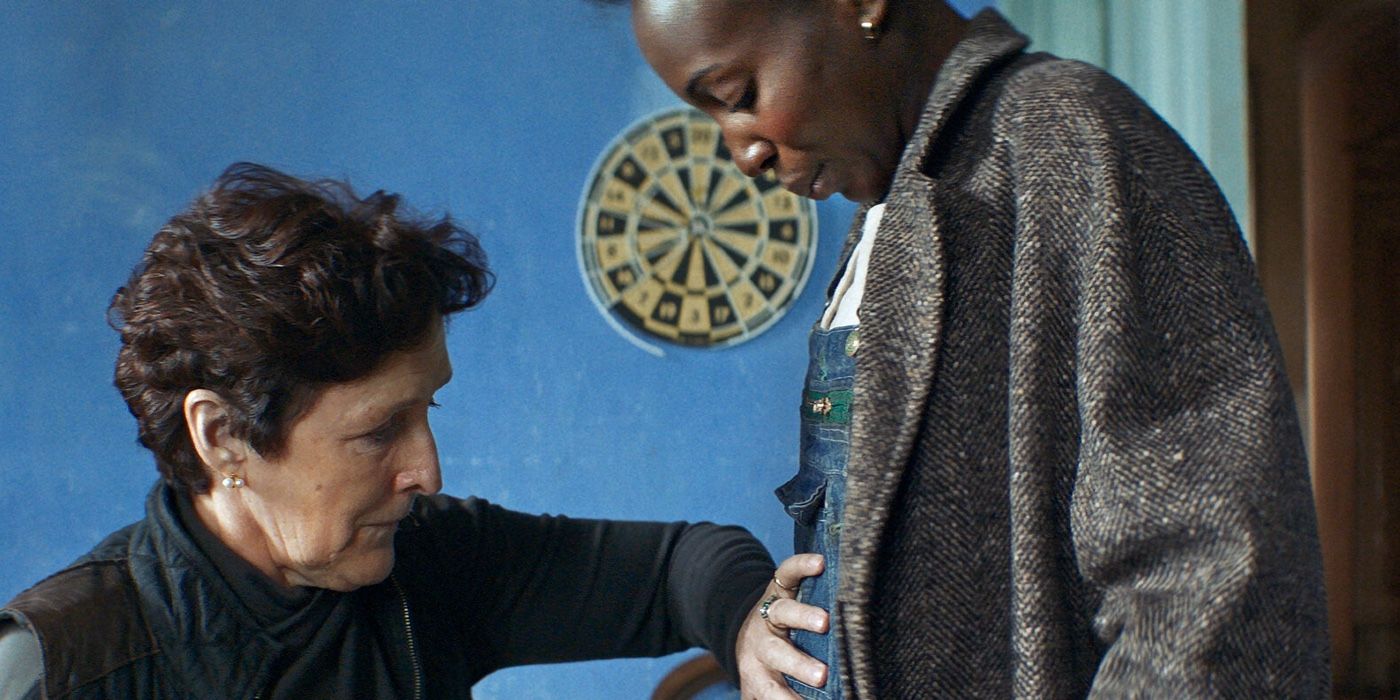
IFC Midnight's Kindred, from director Joe Marcantonio attempts to establish a hostage situation for protagonist Charlotte (Tamara Lawrence), but takes the audience hostage instead. This slow-burn thriller builds on tension centralized around familiar elements such as loss, grief, and in-law related woes, but never quite gets off the ground. Kindred stars Tamara Lawrence, Fiona Shaw, Jack Lowden, Edward Holcroft, and Chloe Pirrie. Marcantonio is primarily known for directing short films, such as 2017's Red Light, and attempts to sneak into the feature film space with Kindred, but despite the involvement of veteran stage and screen actors being attached to the project, ultimately misses the mark. Kindred is packed with significant talent, but the slow pace and tedious script leaves the audience looking for the exit before the movie gets going.
In Kindred, Charlotte (Lawrence) finds herself in a predicament after she ends up staying with her boyfriend's family while pregnant. She intends for her stay to be permanent, but Ben's family - and especially his mother, Margaret (Shaw) - are determined to keep her under their oppressively watchful eye because of the precious cargo she's carrying. All the while, Charlotte's fears about motherhood and her own, troubled experience with an unstable mother are reflecting on her day to day actions, which become increasingly hostile and paranoid, leading her to question the sincerity of her caregivers. Though Margaret and Ben's brother, Thomas (Lowden), seem to bend over backwards to be as helpful as possible to Charlotte in what is arguably her greatest time of need, their self-serving methods and suspicious behaviors lead the expecting mother to believe she's not truly a guest in their home - she's a hostage.

Cinema buffs who are intrigued by the concept of cerebral, deep-thinking psychological horror movies might find a lot to love about Kindred. It's artistically shot, with dream sequences featuring ravens acting as a consistent allegory throughout for Charlotte's mental state. However, despite nodding furiously at other socially-driven thrillers, such as Jordan Peele's Get Out, Kindred never fully establishes itself as a force to be reckoned with in the same way. In fact, it doesn't manage to plant that flag at all. The premise is deceptively simple which, in the horror genre, isn't always a bad thing. However, Marcantonio and Jason McColgan's script relies too much on the audience's perceptions and opinions. At some point, it's the writer and director's job to steer the ship and provide some semblance of answers rather than leaving it largely up to interpretation. Some thrillers can be successful with this direction, and even have benefited from long-lasting audience discussion to unwrap the greater themes and meaning while the end credits roll. Unfortunately, in Kindred, the more likely questions might be in regard what someone missed in case they nodded off halfway through.
Lawrence and Shaw are arguably the best parts of the movie, and provide underlying commentary to one that a great many people might find they can relate to - Charlotte and Margaret are often at odds about what is the best thing to do for Charlotte's unborn child. However, Margaret's stifling, privileged matriarch is at times over the top in a way that borders on ridiculous, which is a shame given Shaw's tremendous talents. This characterization does serve to add necessary strain to Charlotte's overreactions, which could or could not be a result of some undeveloped or burgeoning mental illness, but since she's not a likable or strong enough character to stand on her own despite Lawrence's performance in the role, there's no reward for sitting through these antics. The hostage situation is winked at, but never fully clarified, and that's likely Kindred's most glaring weakness.

While there is something intriguing about a situation where it's unknown whether the protagonist is actually the one inadvertently causing her own problems, Kindred's choice to gaslight the audience by proxy is more confusing than effective. Charlotte's experience with Thomas and Margaret, where they seem to view her as little more than an incubator to bring their new family member into the world, is horrific since it's painted in platitudes, but there's no real terror beyond discomfort. What the movie does do well is paint a shocking portrait of how women's rights can be completely disavowed by someone with more power, privilege, or means to keep them locked up - figuratively, in some ways, but in Kindred's case, literally. For Charlotte, her only true goal seems to be achieving her freedom, something that possibly put her into her precarious situation in the first place. Though Kindred has a few interesting twists and turns, it's relatively predictable and hits the key notes that someone who is well-versed in thrillers might expect from a movie of this kind.
Technically, the movie is sound, with music and cinematography reflecting Charlotte's feelings of growing isolation and danger as Kindred picks up toward its climax. While there is space for artistically created, narrative driven thrillers that rely on different aspects of tension - and even throw some useful social commentary into the mix - Kindred has a bit of an identity crisis that is never fully resolved. Up until the ending, there are too many questions that distract from the greater narrative and, while this can be a strength for some, Kindred runs out of gas in the middle and continues idling toward a predictable conclusion that serves as the movie's only true scare.
Kindred is available on VOD platforms and in select theaters. It is 101 minutes long and is unrated by the MPAA.
Let us know what you thought of the film in the comments section!
from ScreenRant - Feed https://ift.tt/3faVg6X






0 Comments
Please don't use vulgar comments and avoid discussion on Religious matters